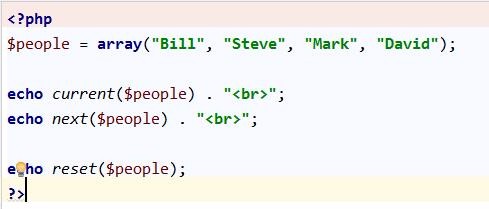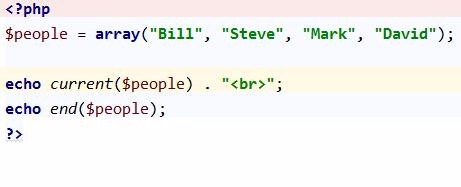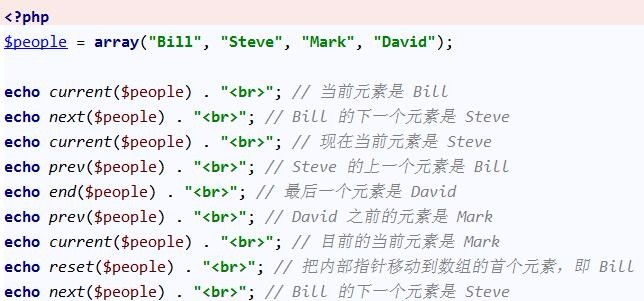10 recommended articles about pointers
The current() function in php returns the current element (unit) in the array. Each array has an internal pointer pointing to its "current" unit, which initially points to the first unit inserted into the array. If we execute current once, the internal pointer will point to the next unit, and we can use current to get the value of the current unit in the array. This article collects several articles on the usage of PHP's array operation function current(). I hope it will be helpful to everyone's understanding of array operations. 1. php array function current() definition and usage The current() function in php returns the current element (unit) in the array. If the current element is empty or the current element has no value, it returns FALSE. Each array has an internal pointer pointing to its "current" element, which initially points to the first element inserted into the array. This function does not move the internal pointer of the array. If you need to move the pointer, you need to cooperate with other functions. Let’s take a look. 2. Detailed explanation of php end() function and current() function usage examples in php end
1. Recommended 10 articles about php current

Introduction: The current() function in PHP returns the current element (unit) in the array. Each array has an internal pointer pointing to it. Its "current" unit initially points to the first unit inserted into the array. If we execute current once, the internal pointer will point to the next unit, and we can use current to get the value of the current unit in the array. This article collects several articles on the usage of PHP's array operation function current(). I hope it will be helpful to everyone's understanding of array operations. 1.php array function current(...
2. 10 recommended articles about array operations

Introduction: The current() function in PHP returns the current element (unit) in the array. Each array has an internal pointer pointing to its "current" The unit initially points to the first unit inserted into the array. If we execute current once, the internal pointer will point to the next unit. We can use current to get the value of the current unit in the array. This article collects several articles about. The usage of php array function current(), I hope it will be helpful to everyone's understanding of array operations. 1.php array function current(...
3. mysql_fetch_field function example. Usage summary

Introduction: mysql_init initializes the database link – gets a link mysql_real_connect connects to the database server and executes mysql_query query – The query statement is a string that retrieves each row separately. mysql_store_result – the result is stored in the link. It is a one-time query. From the result set, the header information is obtained – mysql_fetch_fields – the header information is stored in the memory space parsing table pointed to by the MYSQL_FIELD type pointer. Header –mysql_...
4. Summary of usage of mysql_fetch_field() function

Introduction: mysql_init initializes the database link – gets a link mysql_real_connect connects to the database server and executes mysql_query query – the query statement is a string and retrieves each row separately mysql_store_result – the result is stored in the link and belongs once The query obtains the header information from the result set – mysql_fetch_fields – the header information is stored in the memory space pointed to by the MYSQL_FIELD type pointer and parses the header – mysql_...
##5. php Returns the elements in the array current() function usage summary

Introduction: The current() function in PHP returns the current element (unit) in the array. Each array has an internal pointer pointing to its "current" unit, which initially points to the element inserted into the array. For the first unit, if we execute current once, the internal pointer will point to the next unit, and we can use current to get the value of the current unit in the array. This article collects several articles on the usage of PHP's array operation function current(). I hope it will be helpful to everyone's understanding of array operations.

Introduction: The current() function in PHP returns the current element (unit, which is the first element of the array) in the array. The next() function points the internal pointer to the next element in the array. element and output the value of the element. The reset() function points the internal pointer to the first element in the array and outputs the value of the element. This article mainly introduces the usage of current, next and reset functions in PHP. The example form details the specific usage of the functions current, next and reset for array operations in PHP. It has certain reference value for in-depth understanding of the usage of arrays. I hope it will be helpful to everyone's understanding of arrays
7. Detailed explanation of usage examples of php end() function and current() function

# #Introduction: The end() function in php points the internal pointer of the array to the last element and returns the value of the element, while the current() function returns the current element (unit) in the array, which is the first element of the array. One of the two functions returns the first element of the array, and the other returns the last element of the array. Let’s take a look at the usage of these two functions.
8. php Array Definition and usage of function current()

php framework and ajax implementation. Summary of drop-down menu functions
##Introduction: In Web development, drop-down menus are displayed in It consists of the main menu bar at the top of the window and submenus below each menu bar. Usually, only the menu bar is displayed in the window, and when the mouse pointer points to the menu bar, the submenus of the menu bar are displayed. The menu is displayed 10.
10.
Introduction: jQuery is a javascript library that is very convenient to use and very powerful. Normally, only the menu bar is displayed in the window, and when the mouse pointer points to the menu bar, the menu bar's submenus are displayed. When the mouse pointer leaves the menu, the submenu is hidden and only the main menu bar is displayed.
 [Related Q&A recommendations]:
[Related Q&A recommendations]:
javascript - Ask a question about JS function.apply()
Memory issues pointed to by pointers in c++
Arithmetic issues with pointers in C language
java - c/c++ pointers point to arrays and data Is there any ambiguity in type judgment?
c++ - What happens after calling the free() function on a piece of memory?
The above is the detailed content of 10 recommended articles about pointers. For more information, please follow other related articles on the PHP Chinese website!

Hot AI Tools

Undresser.AI Undress
AI-powered app for creating realistic nude photos

AI Clothes Remover
Online AI tool for removing clothes from photos.

Undress AI Tool
Undress images for free

Clothoff.io
AI clothes remover

Video Face Swap
Swap faces in any video effortlessly with our completely free AI face swap tool!

Hot Article

Hot Tools

Notepad++7.3.1
Easy-to-use and free code editor

SublimeText3 Chinese version
Chinese version, very easy to use

Zend Studio 13.0.1
Powerful PHP integrated development environment

Dreamweaver CS6
Visual web development tools

SublimeText3 Mac version
God-level code editing software (SublimeText3)

Hot Topics
 Alipay PHP SDK transfer error: How to solve the problem of 'Cannot declare class SignData'?
Apr 01, 2025 am 07:21 AM
Alipay PHP SDK transfer error: How to solve the problem of 'Cannot declare class SignData'?
Apr 01, 2025 am 07:21 AM
Alipay PHP...
 How does session hijacking work and how can you mitigate it in PHP?
Apr 06, 2025 am 12:02 AM
How does session hijacking work and how can you mitigate it in PHP?
Apr 06, 2025 am 12:02 AM
Session hijacking can be achieved through the following steps: 1. Obtain the session ID, 2. Use the session ID, 3. Keep the session active. The methods to prevent session hijacking in PHP include: 1. Use the session_regenerate_id() function to regenerate the session ID, 2. Store session data through the database, 3. Ensure that all session data is transmitted through HTTPS.
 Explain JSON Web Tokens (JWT) and their use case in PHP APIs.
Apr 05, 2025 am 12:04 AM
Explain JSON Web Tokens (JWT) and their use case in PHP APIs.
Apr 05, 2025 am 12:04 AM
JWT is an open standard based on JSON, used to securely transmit information between parties, mainly for identity authentication and information exchange. 1. JWT consists of three parts: Header, Payload and Signature. 2. The working principle of JWT includes three steps: generating JWT, verifying JWT and parsing Payload. 3. When using JWT for authentication in PHP, JWT can be generated and verified, and user role and permission information can be included in advanced usage. 4. Common errors include signature verification failure, token expiration, and payload oversized. Debugging skills include using debugging tools and logging. 5. Performance optimization and best practices include using appropriate signature algorithms, setting validity periods reasonably,
 Describe the SOLID principles and how they apply to PHP development.
Apr 03, 2025 am 12:04 AM
Describe the SOLID principles and how they apply to PHP development.
Apr 03, 2025 am 12:04 AM
The application of SOLID principle in PHP development includes: 1. Single responsibility principle (SRP): Each class is responsible for only one function. 2. Open and close principle (OCP): Changes are achieved through extension rather than modification. 3. Lisch's Substitution Principle (LSP): Subclasses can replace base classes without affecting program accuracy. 4. Interface isolation principle (ISP): Use fine-grained interfaces to avoid dependencies and unused methods. 5. Dependency inversion principle (DIP): High and low-level modules rely on abstraction and are implemented through dependency injection.
 How to debug CLI mode in PHPStorm?
Apr 01, 2025 pm 02:57 PM
How to debug CLI mode in PHPStorm?
Apr 01, 2025 pm 02:57 PM
How to debug CLI mode in PHPStorm? When developing with PHPStorm, sometimes we need to debug PHP in command line interface (CLI) mode...
 How to automatically set permissions of unixsocket after system restart?
Mar 31, 2025 pm 11:54 PM
How to automatically set permissions of unixsocket after system restart?
Mar 31, 2025 pm 11:54 PM
How to automatically set the permissions of unixsocket after the system restarts. Every time the system restarts, we need to execute the following command to modify the permissions of unixsocket: sudo...
 Explain late static binding in PHP (static::).
Apr 03, 2025 am 12:04 AM
Explain late static binding in PHP (static::).
Apr 03, 2025 am 12:04 AM
Static binding (static::) implements late static binding (LSB) in PHP, allowing calling classes to be referenced in static contexts rather than defining classes. 1) The parsing process is performed at runtime, 2) Look up the call class in the inheritance relationship, 3) It may bring performance overhead.
 How to send a POST request containing JSON data using PHP's cURL library?
Apr 01, 2025 pm 03:12 PM
How to send a POST request containing JSON data using PHP's cURL library?
Apr 01, 2025 pm 03:12 PM
Sending JSON data using PHP's cURL library In PHP development, it is often necessary to interact with external APIs. One of the common ways is to use cURL library to send POST�...






